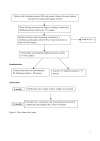Nutritional treatment of aged individuals with Alzheimer disease living at home with their spouses: study protocol for a randomized controlled trial
- PMID: 22624652
- PMCID: PMC3517368
- DOI: 10.1186/1745-6215-13-66
Nutritional treatment of aged individuals with Alzheimer disease living at home with their spouses: study protocol for a randomized controlled trial
Abstract
Background: Nutritional status often deteriorates in Alzheimer's disease (AD). Less is known about whether nutritional care reverses malnutrition and its harmful consequences in AD. The aim of this study is to examine whether individualized nutritional care has an effect on weight, nutrition, health, physical functioning, and quality of life in older individuals with AD and their spouses living at home.
Methods: AD patients and their spouses (aged > 65 years) living at home (n = 202, 102 AD patients) were recruited using central AD registers in Finland. The couples were randomized into intervention and control groups. A trained nutritionist visited intervention couples 4-8 times at their homes and the couples received tailored nutritional care. When necessary, the couples were given protein and nutrient-enriched complementary drinks. All intervention couples were advised to take vitamin D 20 μg/day. The intervention lasted for one year. The couples of the control group received a written guide on nutrition of older people. Participants in the intervention group were assessed every three months. The primary outcome measure is weight change. Secondary measures are the intake of energy, protein, and other nutrients, nutritional status, cognition, caregiver's burden, depression, health related quality of life and grip strength.
Discussion: This study provides data on whether tailored nutritional care is beneficial to home-dwelling AD patients and their spouses.
Trial registration: ACTRN 12611000018910.
References
-
- Seth R. Weight loss in Alzheimer’s disease. Int J Geriatr Psychiatry. 1994;9:605–620. doi: 10.1002/gps.930090803. - DOI
-
- Gillette-Guyonnet S, Nourhashemi F, Andrieu S, de Glisezinski I, Ousset PJ, Riviere D, Albarede JL, Vellas B. Weight loss in Alzheimer disease. Am J Clin Nutr. 2000;71(Suppl):637–642. - PubMed
-
- White H, Pieper C, Schmader K. The association of weight change in Alzheimer’s disease with severity of disease and mortality: a longitudinal analysis. J Am Geriatr Soc. 1998;46:1232–1234. - PubMed
Publication types
MeSH terms
Substances
LinkOut - more resources
Full Text Sources
Medical


